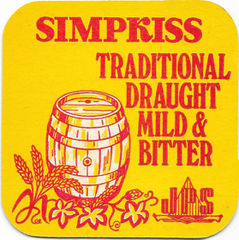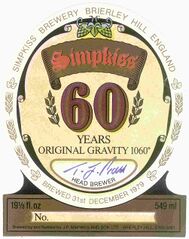J. P. S. Means Beer—(Blackcountryman Volume 6,4) by Geoff Stevens
- societyblackcountr
- Jul 10, 2022
- 4 min read
Reminiscing about beer with an old friend who used to be a drayman, we were reminded of the Simkiss Brewery in Brierley Hill. A quick look through our amazing magazine archive soon unearthed this fascinating look at the brewery which sadly closed in July 1985. Andrew Homer.
In a time of commercial mergers and takeovers, it is indeed surprising that a town the size of Brierley Hill has two independent breweries. Standing in Brettell Lane backed by the tall brewery buildings, and no more than a mile from Batham's Brewery, is the Foley Arms Inn. This house saw the beginning of J. P. Simpkiss & Son Ltd. When Joseph Paskin Simpkiss bought the inn over 50 years ago, it was even then a home-brewed house. In the early days, the beer was brewed in what is now the lounge and then run down into cellar for racking. When required the barrels were hauled from below on a rope.

Joseph Paskin Simpkiss
In 1926, the founder’s son, Dennis, joined his father in the business, having just completed a year's training at Ashton Gate Brewery, Bristol and now ready, at barely nineteen years of age, to take over the brewing. Five houses were owned by the brewery at this time. Joseph Simpkiss died in 1938 and Mr. Dennis Simpkiss took control of the company.
Mild beer was the popular drink in the area before the war and Simpkiss' brewed twice as much mild as bitter. In recent years, this position has reversed. It is interesting to note that from 1926 until 1946, except for an eighteen month period in 1931-2, Simpkiss' mild ale remained at six pence (2½p) per pint.
A big step was taken in 1955. when Simpkiss', who had thirteen public houses by then. merged with Johnson and Phipps Ltd. of Wolverhampton, who had the same number of houses. J. P. S. Breweries was formed, but the partnership was dissolved in about 1967 when Mr. Phipps decided to cease trading. The Wolverhampton Brewery was in Friar Street and has since been demolished. J. P. Simpkiss and Son bought the Shakespeare Inn and The Tiger, both in Willenhall, and The Castle Inn, Lye, from Mr. Phipps. The New Inns, Brierley Hill was also purchased. The Queen’s Head, The Britannia, The Wrekin View (all in Dawley), The Shakespeare (Bilston), The Quarterhouse (Wolverhampton). The Round House (Dudley), The White Dog (Darlaston), and The Wheatsheaf (Cannock) were sold to Banks's.
Following tradition, another member of the family entered the business at the age of nineteen, namely Jonathan Patrick Simpkiss. It is worthy of note that his initials are the same as those of the founder and of Johnson, Phipps and Simpkiss. These three initials have thus been representative of the brewery during its entire operation.
Today, in addition to the inns purchased from Phipps, The Birch Tree Inn, The Talbot Inn, The Foley Arms, The Plough Inn (all at Brierley Hill), the Albion Inn, Old Bush Inn, Navigation Inn, Leopard Inn (in the Wall Heath/kingswinford areas), Jolly Crispin and the Five Ways Inn (Upper and Lower Gornal respectively). The Waterloo (Wollaston) and The Old PIough Inn at Kinver are all tied houses. A total of sixteen houses. The Bird in Hand at Cradley Heath has recently been lost due to plans for a ring road in that area. In the past, before it became a Banks’s house, the famous Glynne Arms (Crooked House) at Himley was supplied by J.P.S. More recently, The Druid's Head at Hurst Hill, one of the last of the one-house, home-brewed concerns to trade in the Black Country, dispensed Simpkiss' beer, after the death of Joe Flavell its owner/brewer. Simpkiss also supply a great number of clubs and other free trade areas.

The Glynne Arms (Crooked House)
The brewery is built on the tower system. This means that the process begins at the top of the tall building and the final product emerges at its base. Because all stages of the production are fed by gravity, virtually no pumping is required for manufacture. Malt, hops and the various sugars used have to be raised to the top of the building. where the malt is hopper fed, through a grist tube (a kind of mincer) into the mash tun. Water, at 160° F., is applied to leach out the sugars from the malt. This, the wort, is then boiled in a spherical copper vessel until its volume has been reduced by ten per cent. The copper in use was obtained from Darby's Brewery, Greets Green, West Bromwich, and was reduced from 65 to 40 barrel size for use at this, The Dennis, brewery. After filtration through the hopback, the wort is cooled ready for fermentation. Pure filtered air is introduced at this stage as food for the yeast. The yeast is added to the wort in the fermentation tank and fermentation is completed in about five days. The head brewer is Mr. Frank Riley, a stalwart Simpkiss man of 35 years service, who supervises 3 or 4 brews a week. Both mild and bitter are brewed and a strong ale, of 1.051 initial gravity, is made for sale as draught ale in winter and bottled all the year round. The last twelve months has seen the introduction of keg bitter to the range, but traditional draught ales still have the bigger slice of the trade.
From Brewerypedia
The bottling department bottles Mann's ales, Guinness and other brands in addition to the Simpkiss range. Mr. Perks has been bottling and transport manager for over 25 years. Mr. Charles Smith, bottling foreman, showed members of the Black Country Society industrial archaeology group the bottling process during their recent visit to the brewery. The bottles are washed in caustic soda, then swilled in hot and cold water before being filled with beer. They are then crown capped and labelled. The system is completely conveyorised. Finally, the bottles are loaded into ovens for pasteurisation at 1400 F.—55 minutes for half-pints and 65 minutes for pint sizes. Mr. Vic Cook, a representative for J.P.S. is truly steeped in the brewing tradition. His family, beginning with his great-grandfather, were brewers in the Lye and Mr. Cook says that the first glass tankards, replacing the pottery vessels of humbler times in Lye, were introduced to the area by the Cooks. The Anvil, at Lye, was the headquarters of the brewery. Sadly Cook's home-brewed ales are no longer brewed, but Mr. Vic Cook is still very much concerned, through J. P. Simkiss & Son. with the supply of Black Country beer to Black Country men.






Comentarios